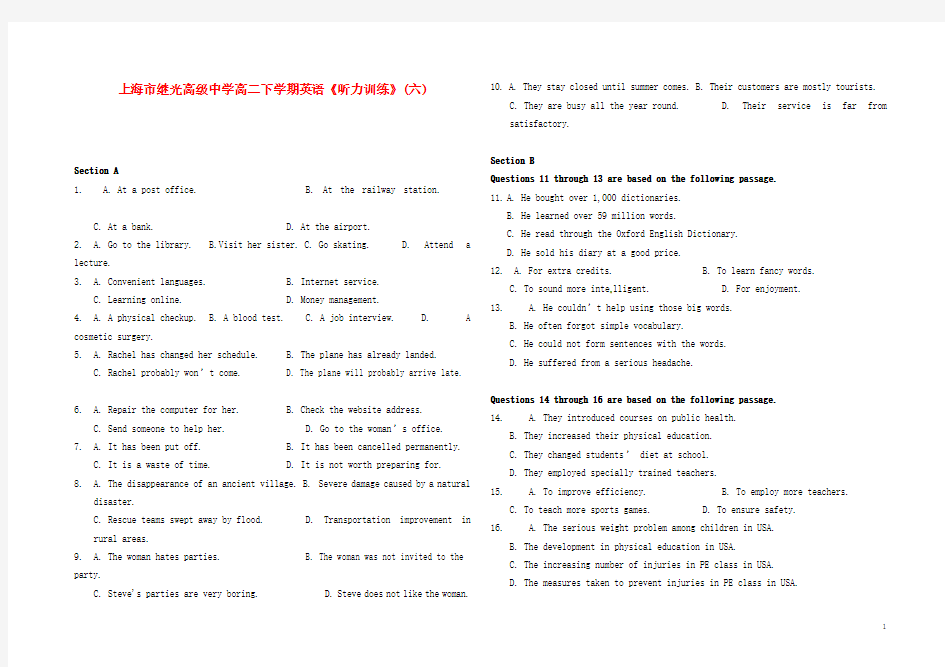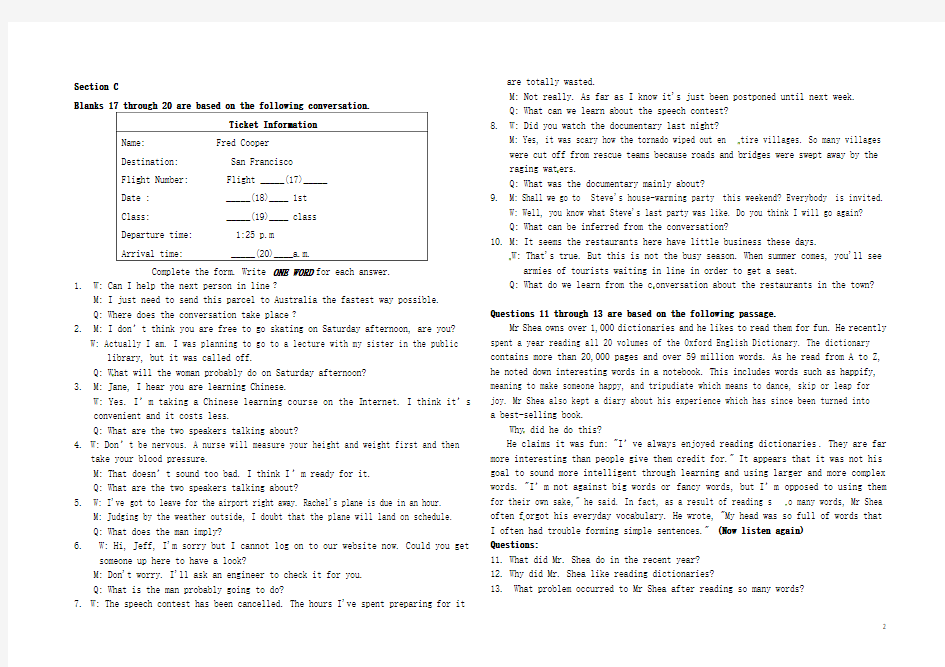上海市继光高级中学高二英语下学期《听力训练》(1)


上海市继光高级中学高二下学期英语《听力训练》(六)
Section A
1. A. At a post office. B. At the railway station.
C. At a bank.
D. At the airport.
2. A. Go to the library. B.Visit her sister. C. Go skating. D. Attend a lecture.
3. A. Convenient languages. B. Internet service.
C. Learning online.
D. Money management.
4. A. A physical checkup. B. A blood test. C. A job interview. D. A cosmetic surgery.
5. A. Rachel has changed her schedule. B. The plane has already landed.
C. Rachel probably won’t come.
D. The plane will probably arrive late.
6. A. Repair the computer for her. B. Check the website address.
C. Send someone to help her.
D. Go to the woman’s office.
7. A. It has been put off. B. It has been cancelled permanently.
C. It is a waste of time.
D. It is not worth preparing for.
8. A. The disappearance of an ancient village. B. Severe damage caused by a natural
disaster.
C. Rescue teams swept away by flood.
D. Transportation improvement in
rural areas.
9. A. The woman hates parties. B. The woman was not invited to the party.
C. Steve's parties are very boring.
D. Steve does not like the woman. 10. A. They stay closed until summer comes. B. Their customers are mostly tourists.
C. They are busy all the year round.
D. Their service is far from
satisfactory.
Section B
Questions 11 through 13 are based on the following passage.
11.A. He bought over 1,000 dictionaries.
B. He learned over 59 million words.
C. He read through the Oxford English Dictionary.
D. He sold his diary at a good price.
12. A. For extra credits. B. To learn fancy words.
C. To sound more inte lligent.
D. For enjoyment.
13. A. He couldn’t help using those big words.
B. He often forgot simple vocabulary.
C. He could not form sentences with the words.
D. He suffered from a serious headache.
Questions 14 through 16 are based on the following passage.
14. A. They introduced courses on public health.
B. They increased their physical education.
C. They changed students’ diet at school.
D. They employed specially trained teachers.
15. A. To improve efficiency. B. To employ more teachers.
C. To teach more sports games.
D. To ensure safety.
16. A. The serious weight problem among children in USA.
B. The development in physical education in USA.
C. The increasing number of injuries in PE class in USA.
D. The measures taken to prevent injuries in PE class in USA.
Section C
Ticket Information
Name: Fred Cooper
Destination: San Francisco
Flight Number: Flight _____(17)_____
Date : _____(18)____ 1st
Class: _____(19)____ class
Departure time: 1:25 p.m
Arrival time: _____(20)____a.m.
Complete the form. Write ONE WORD for each answer.
1. W: Can I help the next person in line?
M: I just need to send this parcel to Australia the fastest way possible.
Q: Where does the conversation take place?
2. M: I don’t think you are free to go skating on Saturday afternoon, are you?
W: Actually I am. I was planning to go to a lecture with my sister in the public library, but it was called off.
Q: W hat will the woman probably do on Saturday afternoon?
3. M: Jane, I hear you are learning Chinese.
W: Yes. I’m taking a Chinese learni ng course on the I nternet. I think it’s convenient and it costs less.
Q: What are the two speakers talking about?
4. W: Don’t be nervous. A nurse will measure your height and weight first and then
take your blood pressure.
M: That doesn’t sound too bad. I think I’m ready for it.
Q: What are the two speakers talking about?
5. W: I've got to leave for the airport right away. Rachel's plane is due in an hour.
M: Judging by the weather outside, I doubt that the plane will land on schedule.
Q: What does the man imply?
6. W: Hi, Jeff, I'm sorry but I cannot log on to our website now. Could you get
someone up here to have a look?
M: Don't worry. I'll ask an engineer to check it for you.
Q: What is the man probably going to do?
7. W: The speech contest has been cancelled. The hours I've spent preparing for it
are totally wasted.
M: Not really. As far as I know it's just been postponed until next week.
Q: What can we learn about the speech contest?
8. W: Did you watch the documentary last night?
M: Yes, it was scary how the tornado wiped out en tire villages. So many villages were cut off from rescue teams because roads and bridges were swept away by the raging wat ers.
Q: What was the documentary mainly about?
9.M: Shall we go to Steve's house-warming party this weekend? Everybody is invited.
W: Well, you know what Steve's last party was like. Do you think I will go again?
Q: What can be inferred from the conversation?
10.M: It seems the restaurants here have little business these days.
W: That's true. But this is not the busy season. When summer comes, you'll see armies of tourists waiting in line in order to get a seat.
Q: What do we learn from the c onversation about the restaurants in the town?
Questions 11 through 13 are based on the following passage.
Mr Shea owns over 1,000 dictionaries and he likes to read them for fun. He recently spent a year reading all 20 volumes of the Oxford English Dictionary. The dictionary contains more than 20,000 pages and over 59 million words. As he read from A to Z, he noted down interesting words in a notebook. This includes words such as happify, meaning to make someone happy, and tripudiate which means to dance, skip or leap for joy. Mr Shea also kept a diary about his experience which has since been turned into a best-selling book.
Why did he do this?
He claims it was fun: "I’ve always enjoyed reading dictionaries. They are far more interesting than people give them credit for." It appears that it was not his goal to sound more intelligent through learning and using larger and more complex words. "I’m not against big words or fancy words, but I’m opposed to using them for their own sake," he said. In fact, as a result of reading s o many words, Mr Shea often f orgot his everyday vocabulary. He wrote, "My head was so full of words that I often had trouble forming simple sentences." (Now listen again)
Questions:
11.What did Mr. Shea do in the recent year?
12.Why did Mr. Shea like reading dictionaries?
13. What problem occurred to Mr Shea after reading so many words?
